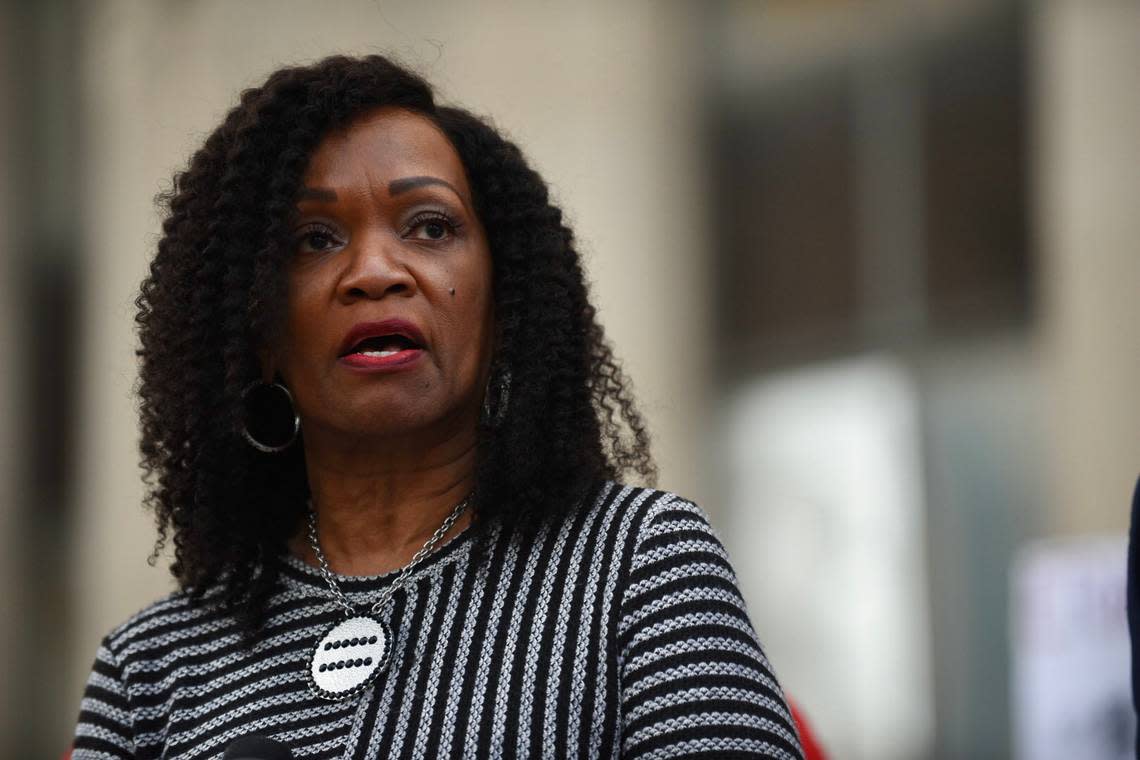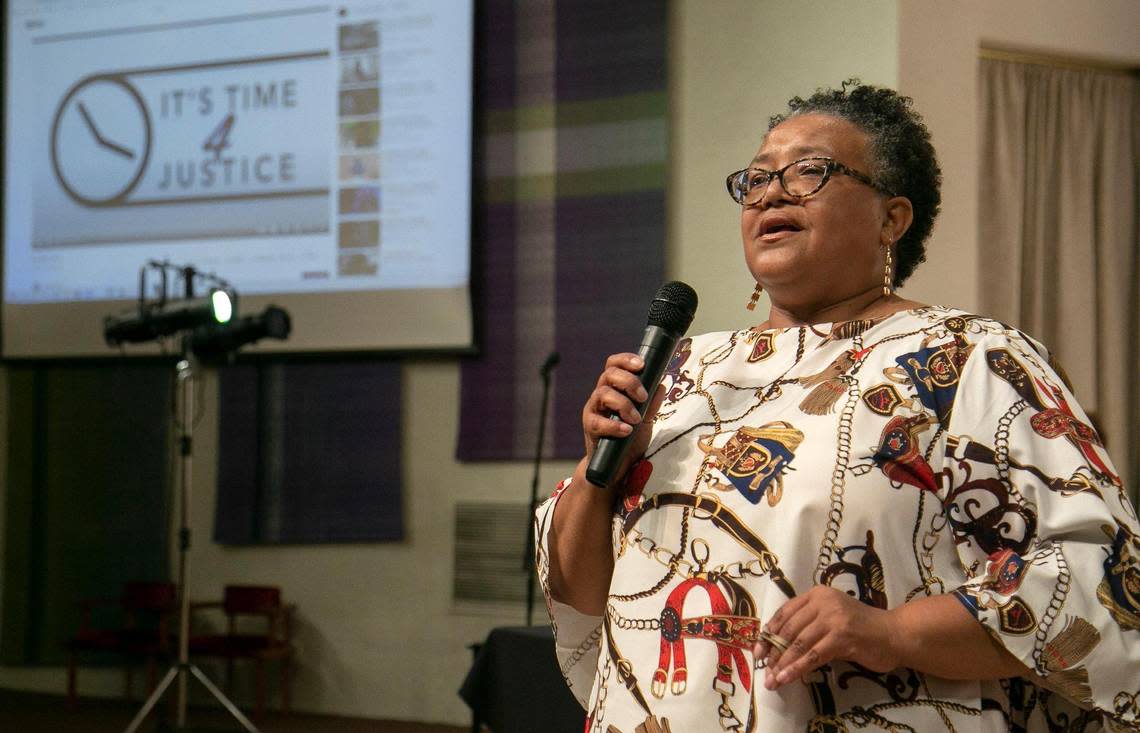Black leaders criticize police naming ‘witness’ in Excelsior Springs kidnapping case
Black leaders in Kansas City said they were unhappy with a police bulletin this week that named a possible witness in an ongoing rape and kidnapping case that has already angered many across the metro area.
The news release from the Excelsior Springs Police Department included the name, photo and last-known Kansas City address of a Black woman police said they were seeking as a possible witness. But it included few other details about why investigators were seeking her and appeared similar to bulletins that are issued for criminal suspects.
The public identification of the possible witness, an unusual step in an active criminal investigation, was viewed by some as backwards and tone deaf in this case, which has sparked criticism of how police treat cases of missing or endangered Black women.
Black leaders have been angered by the way police handled the case since October, when a 22-year-old Black woman escaped from the Excelsior Springs home of a man who she said kept her captive for weeks after she encountered him in Kansas City. The incident came weeks after police had dismissed as rumors a report in the community that a serial killer was targeting Black women.
Amid reports that the victim told neighbors the man had killed two people and harmed others, some Black community leaders questioned how thoroughly police were investigating those claims and whether police take community concerns seriously in general.
The news release Wednesday struck the same nerve among some leaders.
“There has been a great disregard for the lives of Black women throughout this whole situation,” said Michele Watley, the founder of Shirley’s Kitchen Cabinet, an organization that works to amplify the voices of Black women.
“For the police department to plaster this woman’s information, her personal information across social media in an effort to find her, it raises so many questions,” said Watley, who is a member of the advisory board The Star formed after its “The Truth in Black and white,” project in 2020.
“And for me it raises concerns about her safety.”
Excelsior Springs police said Thursday they had not located the woman named as a witness in the news release and declined to elaborate on how she is connected to their investigation. Police department officials on Friday could not be reached for comment about the community leaders’ concerns.
The department has said it is seeking the woman as a potential witness in the investigation of Timothy M. Haslett Jr., 40, who has for three months remained jailed in Clay County on charges of rape and kidnapping. Haslett was arrested Oct. 7 after authorities say the malnourished 22-year-old woman escaped from the basement of his home and fled to a neighbor’s for help.
Haslett, whose case has garnered national attention, has pleaded not guilty to the crimes.
The Star is not publishing the woman’s name or photo. When the Excelsior Springs police issued the news release, The Star chose not to run a story about it until it could learn more about the woman and why police wanted to talk with her. The Star has so far been unable to talk to the woman, and police have refused to elaborate beyond calling her a potential witness.
On Thursday, a Star reporter spoke with a relative of the woman in Kansas City who said her family has not heard from her in more than 18 months.
The relative, who asked not to be identified out of safety concerns, said the family is worried about her and plans to file a missing persons report with police.
’Where’s the transparency?’
Watley noted that a web page designed to provide updates on the investigation hasn’t been updated since late October.
“Where’s the transparency, where’s the trust if they want to work with us,” Watley said. “If they want cooperation and all of these other things, then they have to develop trust, and trust builds transparency.
“There’s been no accountability to the community through providing updates or new information or even just education on how to keep you and yours safe,” she added.
Gwen Grant, president and CEO of the Urban League of Greater Kansas City, said the news release was vague, did not provide enough critical information and may have put the woman in greater danger.
“It seems to me to be irresponsible that you would put a person’s picture out there and identify her as a potential witness,” Grant said. “You would think that they would want to protect the identity of the witness. I found that to be irresponsible.”

Lora McDonald, executive director with the Metropolitan Organization for Racial and Economic Equality, said she worked as part of the commission overseeing the TIPS Hotline, which takes in anonymous complaints brought by community members who often do not wish to speak with police directly.
Over her time at the Kansas City Metropolitan Crime Commission, she said, she has never seen an instance of a witness being identified in such a public way.
“I am scared for her, the way they are putting her out there,” McDonald said, adding: “Given how all of this has been handled or not handled, why in the world would she want to come forward?”
Ken Novak, a professor of criminal justice and criminology at the University of Missouri-Kansas City, said it in his view it was probably not terribly unusual for police to circulate a notice about a possible witness in a crime.
“’Witness’ is a broad term, and I suspect the police believe she has information that would be helpful for their investigation and presentation of evidence to the prosecutor,” Novak said.
“They may be interested in what she knows, but not necessarily what she’s seen. Obviously they are having difficulty locating her – I suspect they previously circulated a BOLO to other law enforcement agencies, and now are enlisting the public’s assistance.”
Police and community trust
Sheryl Ferguson, an organizer with the group It’s Time 4 Justice who has led protests calling for greater accountability for the Kansas City Police Department, said she thought the news release might actually work in this case.
Excelsior Springs police, she said, could be viewed apart from the Kansas City Police Department, which is under scrutiny for excessive force against Black residents and racism within its ranks.
“They (Excelsior Springs police) may have a better chance of having citizens willing to come forward because they are not a police department that has a bad reputation with the community.”

Steve Young of KC LEAP, an organization that seeks to bring greater accountability to police agencies and assist people who have been victimized by police misconduct, said the news release should be viewed in the context of police and community trust.
There is a long history of wariness about interacting with law enforcement for Black Kansas Citians who have had negative experiences with police.
Examples of those experiences, Young noted, include unchecked abuses of power by the police and instances where witnesses find themselves subjects of a criminal investigation.
“It’s kind of ironic that they need our help to solve crimes. That trust is not there between our community and police,” Young said.
“Law enforcement has made it that way,” he added. “Law enforcement has built that distrust.”
